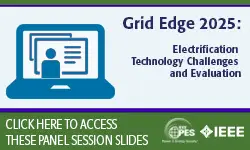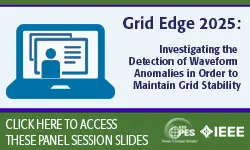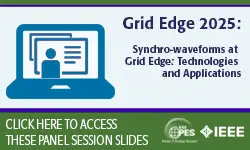Simulation methods, models, and analysis techniques to represent the behavior of bulk power system connected inverter-based resources
Antonello Monti, Ryan Quint, Deepak Ramasubramanian, Ahda Pavani, Alexandra Cameron Karpilow, Ali Mehrizi-Sani, Álvaro Ortega Manjavacas, Amar Ramapuram, Anderson Hoke, Babak Badrzadeh, Costas Vournas, Federico Milano, Giovanni De Carne, Graham Dudgeon, Ilhan Kocar, Jose Daniel Lara, Juan Sanchez-Gasca, Koji Yamashita, Lingling Fan, Mariko Shirazi, Mario Paolone, Nilesh Modi, Pouyan Pourbeik, Renan Furlaneto, Rodrigo Henriquez-Auba, Shruti Dwarkanath Rao, Shuan Dong Siby Jose Plathottam, Xiaoyu Wang
-
Members: FreePES
IEEE Members: $45.00
Non-members: $70.00Pages/Slides: 124
18 Sep 2023
Presently, many utility-scale inverter-based resources (IBRs) are in remote areas of the system where often there is sparse transmission and few synchronous generating resources. This interconnection scenario invariably leads to a low short-circuit current availability at the point of common coupling (PCC) of the IBR. Additionally, most new IBRs are connected to the grid through converter interfaces (e.g., Type 3 and 4 wind generators, photovoltaic solar generators, battery energy storage systems, etc.). Thus, the stability of an increased percentage of inverter-based IBRs in large power systems is an emerging research topic for the reliable operation of the grid. Since IBRs have controls and dynamic behavior that can be quite different from traditional synchronous machines, the mechanisms of instability in low short circuit systems need to be investigated using improved and appropriate mathematical models. This report looks at the availability, applicability, usability, and reliability of present state of the art computer simulation models for representation of IBRs. Further, limitations of the above alternative methods are discussed.
Chairs:
Chair: Antonello Monti
Vice Chair: Ryan Quint
Secretary: Deepak Ramasubramanian
Vice Chair: Ryan Quint
Secretary: Deepak Ramasubramanian
Primary Committee:
Power System Dynamic Performance Committee (PSDP)
Sponsor Committees:
Power System Stability Controls Subcommittee, Task Force on Modeling and Simulation of Large Power Systems with High Penetration of Inverter-Based Generation


